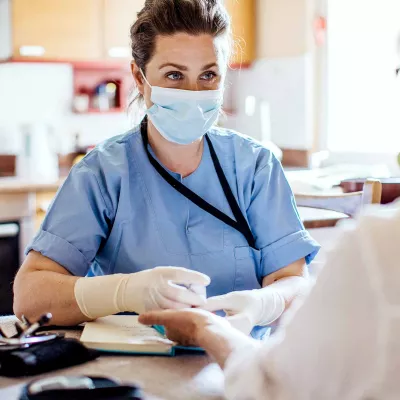
We Work for the Health of Your Heart
Your heart works hard for you. And if you’re living with aortic stenosis, it works harder than most. At the AdventHealth Heart, Lung, and Vascular Institute, we offer transcatheter aortic valve replacement (TAVR) as a minimally invasive alternative to open-heart surgery. TAVR creates less scarring and requires less time in the hospital, so you and your heart can move forward healed, healthy and whole.
Setting the Pace for Exceptional Cardiac Care
-

Experts With Heart
With your heart as our focus, we’ve dedicated more than 20 years to creating one of the leading cardiovascular programs in the region. Since our founding, we’ve performed over 76,000 angioplasty procedures and over 11,000 open-heart surgeries.
-

Innovators in Our Field
Access the most recent advancements in medicine, including TAVR and the Watchman procedure. We’ll ensure you benefit from the most recent advances in cardiology — including effective new therapies and leading-edge technologies.
-

Ranked and Recognized
Caring for you is our greatest achievement. We’ve earned recognition for heart and chest pain care from the American Heart Association, the Joint Commission and the Society of Cardiovascular Patient Care.

TAVR: Designed to Improve Your Heart
TAVR is a minimally invasive procedure and may be a great alternative to traditional open-heart aortic valve replacement.
During the procedure, a new valve is inserted into the diseased one using a catheter through a small incision. This can be performed while the heart is beating. This means a cardiopulmonary bypass is not required and time under anesthesia (or the amount of anesthesia) is reduced. It greatly lowers risk for patients, reduces the burden on the body and shortens recovery time.
The replacement valve is made of natural tissue supported by a strong metal frame. As with traditional aortic valve replacement, TAVR valves have been proven to lengthen patients’ lives, increase heart function and improve their quality of life.
Prepping for TAVR With Detailed Care
After your cardiologist or physician determines you may be a candidate for the TAVR procedure, you’ll be referred to the structural heart program at the AdventHealth Heart, Lung, and Vascular Institute.
Your doctor will either contact our program’s coordinator or speak directly with one of the physicians on our TAVR team.
Once our coordinator receives the referral, they’ll contact you to schedule an appointment and to start testing procedures.
- Pre-Assessment Planning
-
To streamline your experience, once we receive your referral, we start gathering information about your medical history from all the physicians and facilities that have cared for you. We do this prior to your appointment to determine if additional testing is required.
Our team will also work with your doctors and insurance companies to obtain any authorizations you need for testing and schedule your assessment appointment.
If you have questions about your financial responsibility or insurance coverage, contact your insurance provider or our financial services department.
- Required Testing for TAVR
-
Testing procedures you may need before your initial assessment appointment include:
- Carotid ultrasound
- CT scan
- Echocardiogram (ECHO)
- Electrocardiogram (EKG)
- Heart catheterization
- Labs
- Pulmonary function test
- Walk test
- The Initial TAVR Assessment
-
After your cardiologist determines you’re a possible candidate for the TAVR procedure, you’ll be scheduled for an assessment by one of our TAVR surgeons.
At this appointment, the surgeon will review your test results, go over your options, answer all of your questions and order additional testing that may be necessary. Your TAVR coordinator will then arrange and schedule the tests to advance the process.
Once all testing is completed, results will be reviewed by the TAVR multidisciplinary team. When the decision is made to move forward, our team will tailor a personalized plan for your procedure. We encourage you to bring a family member or friend with you to your initial assessment.
After our multidisciplinary team has met to create your treatment plan, the TAVR coordinator will contact you to go over the plan with you and help with further arrangements such as scheduling, additional testing and follow-up appointments.
Once your procedure date has been confirmed, the TAVR coordinator will let you know and will help schedule you for pre-operative testing. She will also inform you about what medications (such as blood thinners) you need to stop taking before the procedure and when you should stop.
- The Day of the Procedure
-
Before your procedure day, a member of our team will contact you about check-in time. When you arrive at the hospital, you’ll enter the main entrance of the AdventHealth Pepin Heart Institute and let the information desk know that you’re scheduled for a procedure. They will instruct you where to go to register.
After registration, you’ll be taken to a room in the hospital where you’ll be prepped for the procedure.
During your procedure, your family and friends can wait for you in the waiting room on the third floor of AdventHealth Pepin Heart Institute.
The procedure typically lasts one to two hours.
- After TAVR
-
After the TAVR procedure is over, you’ll be taken to a private room in our cardiovascular intensive care unit (CVICU).
You’ll be given medication that will allow blood to flow smoothly through your new valve, lowering the risk of developing a blood clot. You’ll also have tests performed, including a physical exam, chest X-ray, blood tests, echocardiogram and electrocardiogram.
Most patients feel better immediately after the new valve has been placed. Your doctor will give you specific instructions to help with your recovery. Most patients stay in the hospital for one to two days after the TAVR procedure.
Be sure to keep your follow-up appointments and carefully follow your doctor’s instructions. These may include a special diet, exercise and medication.
After you’ve fully recovered, you’ll need to inform other doctors about your heart valve replacement before any medical, dental or imaging procedure.
- Medications for TAVR Recovery
-
When you’re discharged, you’ll get instructions about new medications you need to take at home. This typically includes a dual anti-platelet therapy, which usually includes Plavix and aspirin. And, if you were on Coumadin or a blood thinner prior to the TAVR procedure, you’ll continue that medication in addition to aspirin.
You’ll be on the blood thinner for four to six months and will take aspirin for the rest of your life, unless otherwise specified by your doctor. If you’re discharged without a dual anti-platelet therapy prescribed, speak with the TAVR coordinator for further instructions.
To help prevent infection of your new valve, it’s recommended you receive antibiotic medications when having any invasive medical or dental procedures, including teeth cleanings, tooth extractions, colonoscopies or skin cancer removal.
- Follow-Up Care With Your Physician
-
After your TAVR procedure, you’ll need to follow up with your primary care physician and your cardiologist within one week of discharge.
Even after you’ve fully recovered, your heart will need to be checked and your medications will be assessed by your physician. At these appointments, let your doctor know about all medications you’re taking, including over-the-counter products.
Even if you’re feeling better, continue to take medications as prescribed, unless advised by your doctor.
- Follow-Up Care with the TAVR Team
-
Your TAVR coordinator will schedule your 30-day follow-up appointment with the team to monitor your new valve. This appointment will include an echocardiogram and labs.
One year after your procedure, you’ll meet with the team again to evaluate your progress. Contact the TAVR coordinator a month before your procedure’s anniversary to schedule an appointment for another echocardiogram. If you relocate during that year, contact the TAVR coordinator with your new address and phone number.
- Cardiovascular Rehab
-
At your 30-day follow-up, you’ll be given a prescription for cardiovascular rehabilitation. To learn about AdventHealth Cardiovascular Institute’s cardiopulmonary rehab program.
TAVR Patient Testimonial

With You All the Way
You’re ready to move past aortic stenosis and we’re here to help. From your initial assessment to recovery and rehab, you’ll have a team of West Florida’s leading cardiovascular physicians, nurses and technicians on your side for the entire journey.

